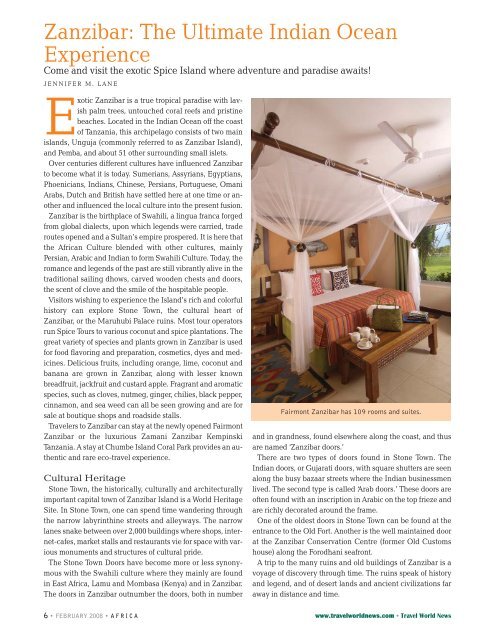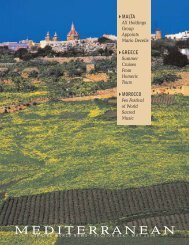You also want an ePaper? Increase the reach of your titles
YUMPU automatically turns print PDFs into web optimized ePapers that Google loves.
Zanzibar: The Ultimate Indian Ocean<br />
Experience<br />
Come and visit the exotic Spice Island where adventure and paradise awaits!<br />
JENNIFER M. LANE<br />
Exotic Zanzibar is a true tropical paradise with lavish<br />
palm trees, untouched coral reefs and pristine<br />
beaches. Located in the Indian Ocean off the coast<br />
of Tanzania, this archipelago consists of two main<br />
islands, Unguja (commonly referred to as Zanzibar Island),<br />
and Pemba, and about 51 other surrounding small islets.<br />
Over centuries different cultures have influenced Zanzibar<br />
to become what it is today. Sumerians, Assyrians, Egyptians,<br />
Phoenicians, Indians, Chinese, Persians, Portuguese, Omani<br />
Arabs, Dutch and British have settled here at one time or another<br />
and influenced the local culture into the present fusion.<br />
Zanzibar is the birthplace of Swahili, a lingua franca forged<br />
from global dialects, upon which legends were carried, trade<br />
routes opened and a Sultan’s empire prospered. It is here that<br />
the African Culture blended with other cultures, mainly<br />
Persian, Arabic and Indian to form Swahili Culture. Today, the<br />
romance and legends of the past are still vibrantly alive in the<br />
traditional sailing dhows, carved wooden chests and doors,<br />
the scent of clove and the smile of the hospitable people.<br />
Visitors wishing to experience the Island’s rich and colorful<br />
history can explore Stone Town, the cultural heart of<br />
Zanzibar, or the Maruhubi Palace ruins. Most tour operators<br />
run Spice Tours to various coconut and spice plantations. The<br />
great variety of species and plants grown in Zanzibar is used<br />
for food flavoring and preparation, cosmetics, dyes and medicines.<br />
Delicious fruits, including orange, lime, coconut and<br />
banana are grown in Zanzibar, along with lesser known<br />
breadfruit, jackfruit and custard apple. Fragrant and aromatic<br />
species, such as cloves, nutmeg, ginger, chilies, black pepper,<br />
cinnamon, and sea weed can all be seen growing and are for<br />
sale at boutique shops and roadside stalls.<br />
<strong>Travel</strong>ers to Zanzibar can stay at the newly opened Fairmont<br />
Zanzibar or the luxurious Zamani Zanzibar Kempinski<br />
Tanzania. A stay at Chumbe Island Coral Park provides an authentic<br />
and rare eco-travel experience.<br />
Cultural Heritage<br />
Stone Town, the historically, culturally and architecturally<br />
important capital town of Zanzibar Island is a <strong>World</strong> Heritage<br />
Site. In Stone Town, one can spend time wandering through<br />
the narrow labyrinthine streets and alleyways. The narrow<br />
lanes snake between over 2,000 buildings where shops, internet-cafes,<br />
market stalls and restaurants vie for space with various<br />
monuments and structures of cultural pride.<br />
The Stone Town Doors have become more or less synonymous<br />
with the Swahili culture where they mainly are found<br />
in East Africa, Lamu and Mombasa (Kenya) and in Zanzibar.<br />
The doors in Zanzibar outnumber the doors, both in number<br />
6 • FEBRUARY 2008 • A FRICA<br />
Fairmont Zanzibar has 109 rooms and suites.<br />
and in grandness, found elsewhere along the coast, and thus<br />
are named ‘Zanzibar doors.’<br />
There are two types of doors found in Stone Town. The<br />
Indian doors, or Gujarati doors, with square shutters are seen<br />
along the busy bazaar streets where the Indian businessmen<br />
lived. The second type is called ‘Arab doors.’ These doors are<br />
often found with an inscription in Arabic on the top frieze and<br />
are richly decorated around the frame.<br />
One of the oldest doors in Stone Town can be found at the<br />
entrance to the Old Fort. Another is the well maintained door<br />
at the Zanzibar Conservation Centre (former Old Customs<br />
house) along the Forodhani seafront.<br />
A trip to the many ruins and old buildings of Zanzibar is a<br />
voyage of discovery through time. The ruins speak of history<br />
and legend, and of desert lands and ancient civilizations far<br />
away in distance and time.<br />
www.travelworldnews.com • <strong>Travel</strong> <strong>World</strong> <strong>News</strong>

















